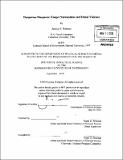Dangerous diasporas : émigré nationalism and ethnic violence
Author(s)
Wattman, Jessica M. (Jessica Marie)
DownloadFull printable version (17.27Mb)
Other Contributors
Massachusetts Institute of Technology. Dept. of Political Science.
Advisor
Roger Petersen.
Terms of use
Metadata
Show full item recordAbstract
The number of exceptionally brutal ethnic confrontations that followed the end of the Cold War brought with them question of diaspora contributions to violence. The unwritten assumption was that diaspora compatriots were natural allies, sharing a strong sense of nationalism and standing at the ready to support their cousins abroad. Indeed, members of ethnic diasporas have shown a propensity to get involved in homeland wars. This study focuses on the extreme elements of these communities, tackling the question of why diaspora nationalists persist in advocating for maximalist solutions to home country conflicts when rationality suggests that they should do nothing or assume a compromise position. The dissertation argues that such hard line positions are the result of strong and enduring emotions. It lays out a model whereby emotions serve as the mechanism through which destructive nationalistic feelings come to dictate diaspora leaders' political positioning. This dynamic results in unyielding stances that are hostile and aggressive. Noteworthy about such reactions is that the primary operating emotion--humiliation--is, in fact, anchored in past episodes of trauma and dishonor that remain significant to certain members of the diaspora community. It endures in the everyday lives of diaspora individuals as a type of potential energy--simmering under the surface but not leading to any kind of extreme action. Only in the face of a specific triggering event does this emotion reactivate and become a vehicle for the expression of zealous ethno-nationalism. While the focus of this dissertation is fairly narrow--diaspora reaction to homeland violence--the work done on framing a theory of emotional causality can provide a launching point off of which a more general theory of emotions and radicalization can be built. While not directly stated, emotions are often assumed in most explanations of errant or radical behavior. Whether it be frustration, humiliation, anger, or alienation that drives people to action that harms themselves and others, it is obvious that a greater understanding of the causes will need to heavily rely on theories of emotions and how, and under what conditions, they lead to extreme behavior.
Description
Thesis (Ph. D.)--Massachusetts Institute of Technology, Dept. of Political Science, 2010. Cataloged from PDF version of thesis. Includes bibliographical references (p. 280-291).
Date issued
2010Department
Massachusetts Institute of Technology. Department of Political SciencePublisher
Massachusetts Institute of Technology
Keywords
Political Science.